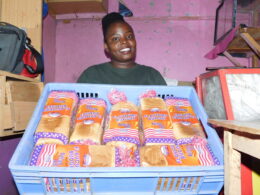Domestic work is constituted as being unique, low skilled, low status and situated in the private borders of the home beyond the reach of legal reforms because it is gendered work
22/03/2021
In August 2020 various clips of Kenyan women rallying and protesting outside the Kenyan consulate in Beirut in Lebanon went viral on social media platforms. In one such video a group of women could be seen repeatedly chanting ‘we want to go home’ while recounting some of the grievances they had. Many of these women had lost their means of income as a result of the economic crisis in Lebanon, the effects of which had been compounded by the Covid-19 pandemic and the August 4th Beirut explosion which killed dozens of people and injured thousands.
Some of the women had been engaging in freelance care, cleaning and hospitality work in order to keep supporting their families back home after escaping from their abusive and exploitative employers who had initially sponsored them to come into Lebanon as Migrant Domestic Workers under the Kafala system. These protests had been organised as a final resort to bring their grievances to light after their pleas for support from the Kenyan consulate, and by extension the Kenyan government, had been unsuccessful. In an expose published by CNN in July 2020, several Kenyan domestic workers in Lebanon accused the Kenyan consulate of extortion, corruption and abuse in their dealings with Kenyans who sought their services.
Where do migrant women workers go for protection and justice when the consulates that are tasked with protecting them fail?
Subsequently, the Kenyan government through the Kuwait embassy pledged to investigate these allegations but no justice has been forthcoming for these women to this day. This crisis then prompted the question; where do migrant women workers go for protection and justice when the consulates that are tasked with protecting them fail; particularly in a country where they face constant hostility and precarity on an individual and systemic level. The CNN expose and the protest videos once again captured the attention of Kenyans sparking outrage and reigniting the conversation around labour migration of Kenyan domestic workers to Middle Eastern countries like Lebanon, Saudi Arabia, Qatar and UAE.
Over the last decade, many of these women have shared horrific accounts of abuse and exploitation that they have faced at the hands of their employers and sometimes recruitment agencies abroad including wage theft, passport confiscation, physical and verbal assault, racial discrimination, limited mobility, overworking up to 20 hours a day, etc. Much of this has been reported in the media but more and more women are still emigrating to Middle Eastern countries for domestic work. For many of them, faced with the threat of destitution from the high levels of unemployment and underemployment in Kenya, the promise of a stable job and salary abroad seems like a dream until they arrive in the country of destination. This International Women’s Month, we reflect on how gender shapes the negative experiences of Kenyan migrant domestic workers in the Middle East in particular focusing on Lebanon. We ask; does gender play a role in creating conditions that leave migrant domestic women vulnerable to abuse and exploitation? In other words, are migrant domestic workers being exploited, excluded and marginalised because they’re women doing ‘women’s work’?
Domestic work is constituted as being unique, low skilled, low status and situated in the private borders of the home beyond the reach of legal reforms
There are an estimated 250,000 to 500,000 migrant domestic workers in Lebanon according to stakeholders with the majority being women from South Asian and African countries. Of this figure, an estimated 3000 are Kenyan. In the absence of functional social care and welfare systems, migrant women are recruited to fill the care vacuum in the household left behind by women in the countries of destination who are now moving into the labour market. This involves undertaking tasks such as cleaning, cooking and caring for children and the elderly; reproductive labour that historically and traditionally has been provided by women unpaid.
As Abimourched posits, the link between women’s customary roles and domestic work has contributed to the social and structural devaluation of domestic work as illegitimate work and by extension the exclusion of domestic workers from legal and social protections. In other words, paid domestic work is constituted as being unique, low skilled, low status and situated in the private borders of the home beyond the reach of legal reforms because it has always been misconceived as gendered work. Additionally, it is work that is being undertaken in “situations that are heavy with the histories of radicalized subordination”. In many ways, the movement of women into the labour market has not necessarily disrupted traditional gender roles in the household where male partners participate in the running of a household but rather this emotionally exerting work has been outsourced to poorer migrant women. Consequently, this increased commodification of domestic work in Lebanon has become racialised further contributing to its devaluation and exclusion from legal reforms.
Within these households, MDWs are forced to occupy a subordinated and inferior role which is affirmed through various rituals. For example some workers are made to eat separately and sometimes to eat leftovers from the family, wear uniforms, wash their clothes separately, sleep on the floor in utility rooms with no privacy. Additionally, many have their passports and mobiles confiscated and their mobility within and outside the home severely limited. But even before their arrival, domestic workers are preceded by racial stereotypes about their level of education, skills, level of hygiene, personality traits such as submissiveness, etc which continues to be reflected in the way they’re treated and paid by their employers. In recent years in Lebanon, there has been an increase in the recruitment of women workers from African countries as they’re considered cheaper and more exploitable. The increased association of migrant women with domestic work also reifies their subordinated and inferior position within these countries and further devalues the work itself. Domestic work is now viewed as ‘dirty work’ done by foreign maids.
Under the Kafala system, responsibility over the worker is relegated from the state to the employer meaning that without their permission, the employee cannot change jobs, leave the place of work or the country
Central to the vulnerability of MDWs to abuse and exploitation in Lebanon is the Kafala system. The Kafala system is a legal framework that “governs the entry, residence and work of domestic migrant workers in Lebanon”. Otherwise known as the sponsorship system, this framework entails “a collection of laws, decrees, ministerial decisions, regulations and customary practices”. One such law is order 319 that regulates the status of foreign nationals in Lebanon. Article 6 of this law stipulates that before entering the country, foreign nationals wishing to pursue work in Lebanon have to obtain an entry visa along with authorisation to work from the Ministry of Labour which in turn requires sponsorship from a prospective employer. After arrival, their employer is responsible for issuing and renewing the worker’s work and residence permits. This means that a worker’s immigration status is always tied to a single employer for the duration of their contract. Under the Kafala system, responsibility over the worker is relegated from the state to the employer meaning that without their permission, the employee cannot change jobs, leave the place of work or the country severely curtailing their freedom of movement and labour. This is also evident in the customary practice by General Security where the worker cannot leave the airport without being accompanied by their employer as well as having their passport confiscated and handed to the employer.
In some cases, MDWs have reported that they had to stay in the airport for hours and even days without adequate food and accommodation while waiting for their employer to pick them up. Further to the sponsorship system which empowers employers with an enormous amount of power over the living and working conditions of MDWs, article 7 of the Lebanese Labour code excludes all domestic workers including MDWs. The exclusion of MDWs results in depriving these workers of the most basic rights enshrined in the Labour Law and others imposed by international labour conventions, such as the minimum wage, set working hours, paid annual leave, health and safety regulations, recourse to arbitration councils, etc. The kafala system and these legal exclusions means that the receiving governments can continue to rely on cheap foreign labour, instead of providing adequate welfare services, while failing to engage with migrant workers as fully embedded relational subjects of rights.
If we were to take the view that the law is “a patchwork of politically motivated choices selected on their ability to maintain status quo of power relations” then the Kafala governance and the legal exclusions of MDWs are a reflection of how gender is still used to dominate, oppress and discriminate against women and even more so racialised and classed women.
More stories


